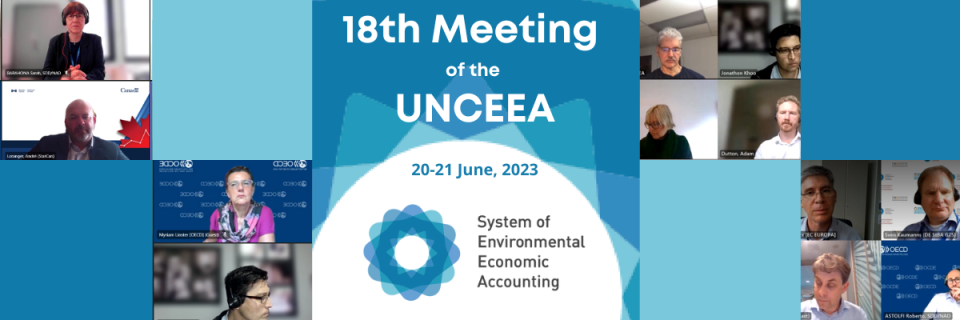The 18th Meeting of the UNCEEA

The Eighteenth Meeting of the UN Committee of Experts on Environmental-Economic Accounting (UNCEEA) took place virtually on 20-21 June 2023. More than 70 participants from national statistical offices and international organizations took part in the annual meeting. The Committee provides the overall vision, coordination, prioritization and direction in the field of environmental-economic accounting and supporting statistics.
One of the main focuses of the meeting was discussing the possible update of the SEEA Central Framework (CF). The SEEA CF was adopted as an international statistical standard eleven years ago. Since then, there have been lessons learned from implementation as well as new opportunities to mainstream its use into policy. In addition, several international statistical standards and classifications are currently being updated, and there is a need to align the SEEA CF, as appropriate, to these updated standards and classifications. As a result, the Committee agreed to a focused update of the SEEA CF with a targeted scope. At the same time, there are concerns about capacity and resources. Thus, the next steps are for the SEEA CF Technical Committee to elaborate further on criteria for prioritization of the work, evaluate the costs/benefits of addressing each of the issues and develop a timeline. The proposal will be provided to the UN Statistical Commission at its 55th Session in 2024.
Implementation of the SEEA Ecosystem Accounting (EA) was another focus of the Committee’s meeting. The SEEA EA Technical Committee has discussed several substantive topics over the last year to further implementation, including the IUCN Global Ecosystem Typology, carbon accounting, global ecosystem mapping initiatives and more. In addition, two working groups, one on forest ecosystems working group and another on oceans, continue to meet and are preparing technical notes. Moving forward, the broader SEEA EA Technical Committee will also look at supporting the development of headline indicators for the Global Biodiversity Framework and help develop practical compilation guidance notes, among other things.
To help further implementation of both the SEEA EA and SEEA CF, the Working Group on Capacity Building created a new implementation guide for the SEEA, which was welcomed by the Committee. The new implementation guide will replace a previous guide from 2014 and will be a web-based living document (available soon). The Working Group on Capacity Building also plans to revitalize its Focal Points network to better engage and communicate with countries on SEEA-related matters.
In addition to implementation, the Committee discussed how to better provide data for users. The Working Group on Global Databases has made significant progress in the global data collection of SEEA accounts. While Eurostat has collected and disseminated air emission, physical energy flow and material flow accounts (among others) for several years already, UNEP, UNSD and OECD have worked to make this data collection global. In particular, UNEP has recently begun global data collection for material flow accounts, and UNSD and OECD have begun global data collection for air emission and physical energy flow accounts this year. Dissemination of these accounts will take place in late 2023 to early 2024.
Finally, the Working Group on Coordination and Communication presented its plans to help mainstream the SEEA into policy initiatives. The group will develop a multipurpose webinar series which targets different audiences. In some cases, the webinars will be targeted to specific policy makers and seek to showcase the benefits and value-added of using the SEEA for policy and decision making. In other cases, the webinars will be more technical, bringing together experts from different communities on measurement issues. In addition, the Committee agreed to incorporate the work of the Business Accounting Working Group into the Working Group on Coordination and Communication. Over the past year, the Business Accounting Working Group worked with a number of business accounting groups to further alignment between public and private sector accounting for the environment and ecosystems. In particular, UNSD has continued to serve as a knowledge partner of the Task Force for Nature-related Financial Disclosures, and the Business Accounting Working Group and SEEA EA Technical Committee provided comments on the GRI draft biodiversity standards.
The Committee ended the meeting by electing André Loranger, Assistant Chief Statistician of Statistics Canada, as the Chair of the UNCEEA noting his long history with the Committee and previous role chairing the Committee’s Working Group on Coordination and Communication.
All papers and presentations can be found on the meeting page: https://seea.un.org/events/18th-meeting-un-committee-experts-environmental-economic-accounting-1
